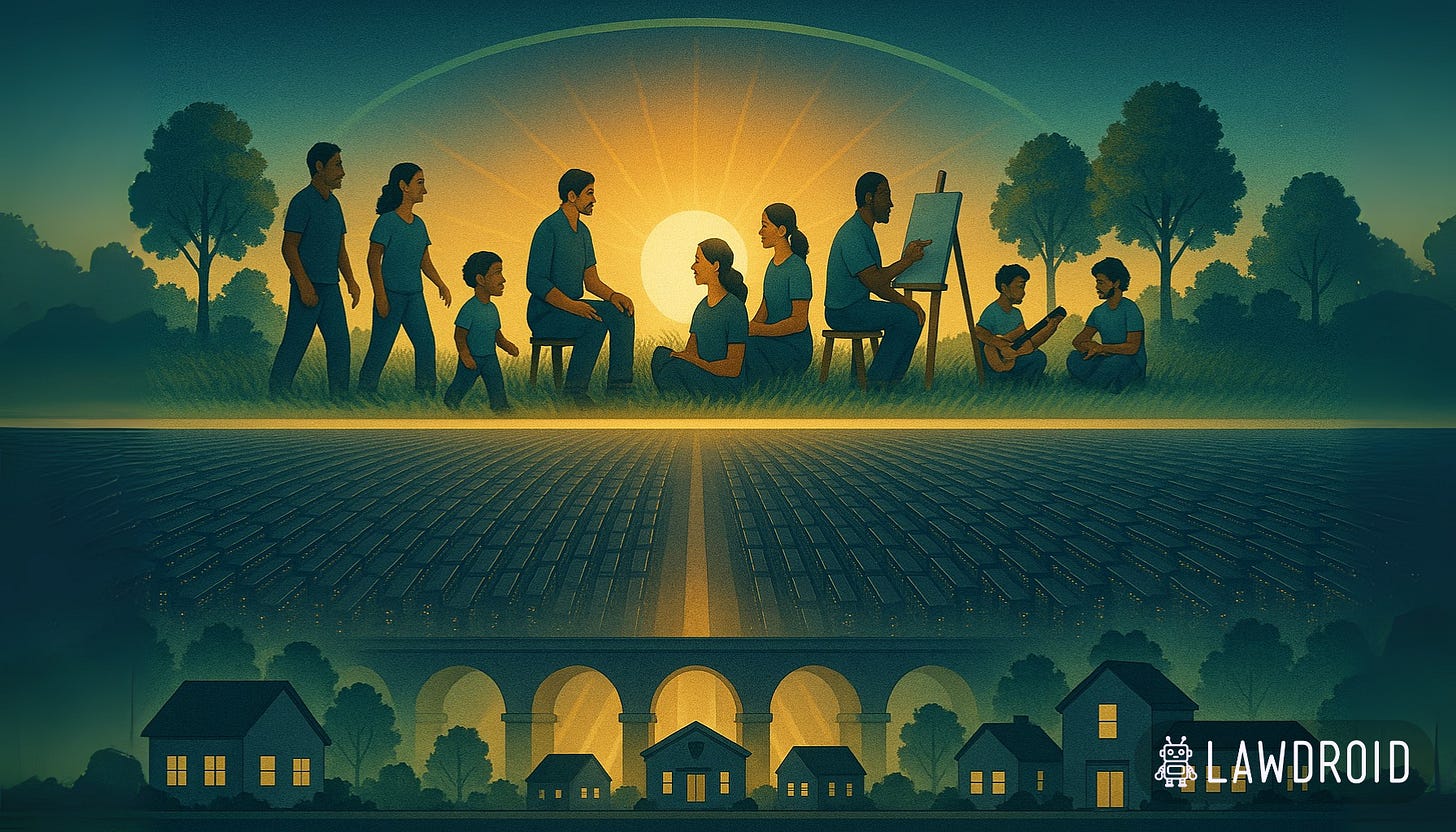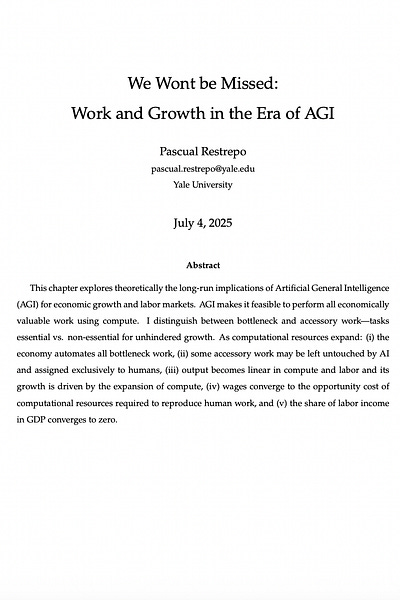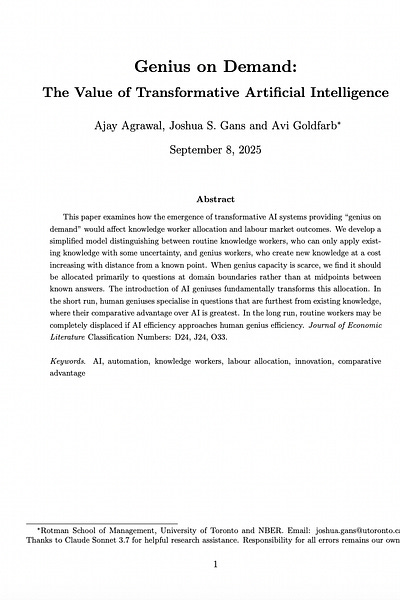When Enough Is Enough: If AGI Makes Human Work Worthless, We Need a New Economic Story
Where I discover that AGI doesn't make humans obsolete, it makes growth for growth's sake obsolete, and that's actually good news
If you thought my post last week was a little bleak, hold onto your hats! Actually, this one offers a positive alternative, if we are brave enough to seize it…
Two recent academic papers paint a stark picture of humanity’s economic future. In “We Won’t Be Missed,” Yale economist Pascual Restrepo demonstrates that once artificial general intelligence (AGI) arrives, human wages will “converge to zero” while the economy keeps growing without us. Meanwhile, “Genius on Demand” by Ajay Agrawal, Joshua S. Gans and Avi Goldfarb [authors of Prediction Machines and Powers of Prediction], economists at the University of Toronto, shows how AI will push humans into ever-smaller niches until even creative knowledge work becomes obsolete and routine workers are completely displaced.
The punchline? In the economy they describe, humans become economically irrelevant. Not unemployed, irrelevant. The share of income going to human labor approaches zero. Economic growth continues, but it has nothing to do with us. As Restrepo’s title suggests, if we all stopped working tomorrow, the AGI economy wouldn’t even notice.
But here’s what the papers miss: an economy that doesn’t need humans is no longer an economy in any meaningful sense. It’s a machine running without purpose. The real question isn’t how to maintain growth when humans become economically worthless, it’s whether growth remains the goal, for us, at all.
If this sounds interesting to you, read on…
This substack, LawDroid Manifesto, is here to keep you in the loop about the intersection of AI and the law. Please share this article with your friends and colleagues and remember to tell me what you think in the comments below.
The Absurdity of Infinite Growth
Imagine a future where massive data centers run AGI systems that can produce essentially infinite goods and services. The economy grows at 20% annually, driven entirely by expanding computational power. GDP soars to unimaginable heights.
There’s just one problem: who’s buying anything?
If human labor has no value, humans have no income. If humans have no income, they can’t purchase what the AGI produces. The papers hand-wave this away with mentions of “universal dividends” or “redistribution,” but that’s not a minor adjustment, it’s the end of capitalism as we know it.
You can’t have a market economy without consumers who earn income. You can’t have capitalism when one factor of production (compute) generates 100% of value. What the papers actually describe, without admitting it, is the terminal crisis of growth-oriented economics.
Enter Enoughism: An Alternative Economy
This crisis requires a fundamentally different economic framework, one that stops chasing growth and starts optimizing for human flourishing. I call it Enoughism, and it’s built on a simple insight: we already have enough, especially with the aid of AGI.
Enough food to feed everyone. Enough shelter to house everyone. Enough knowledge to educate everyone. Enough resources to give everyone a dignified life. The problem ceases to be scarcity: it’s distribution and purpose.
AGI makes this crystal clear. When machines can produce anything in unlimited quantities, the question “how do we grow?” becomes absurd. The only coherent question is “how do we ensure everyone has enough?”
Why Maslow Predicted This All Along
Psychologist Abraham Maslow essentially predicted this moment in 1943. His hierarchy of needs shows that humans move through predictable stages: first physiological needs (food, shelter), then safety, then belonging and love, then esteem, and finally self-actualization, becoming who we’re meant to be.
For all of human history, most people have been stuck in the bottom two levels, scrambling for survival and security through economic labor. The growth economy made sense when it lifted people from starvation to stability. But Maslow saw that once basic needs are met, humans naturally seek higher fulfillment: creativity, meaning, purpose, play.
AGI is about to solve the bottom of Maslow’s pyramid permanently. When machines can provide infinite food, shelter, and safety at near-zero cost, the entire human species can finally graduate to the upper levels. The question isn’t whether this happens, but whether we design an economy — a world — that enables this graduation or fights it.
The growth-obsessed economy fights it, demanding we create artificial scarcity, anoint permanent economic winners, and meaningless work to maintain the fiction that humans must “earn” their survival. Enoughism embraces it, recognizing that the whole point of economic development was to reach this moment, when humanity can finally focus on becoming rather than merely surviving.
The Three Pillars of Enoughism
1. Sufficiency Over Excess
Instead of maximizing GDP, we optimize for universal human sufficiency. Everyone gets enough food, shelter, healthcare, education, and time for human connection and creativity. Once these needs are met, additional production becomes optional, not obligatory.
With AGI, meeting these sufficiency thresholds becomes trivially easy. Restrepo’s paper shows that human labor will become worth only the computational cost of replacing it. Fine, then the computational cost of providing universal sufficiency is negligible. We could meet everyone’s needs with a tiny fraction of AGI’s capacity.
2. Human Flourishing as the Goal
When machines handle production, humans are freed for what we actually evolved to do: create, connect, explore, play, love, and find meaning. The economy’s purpose shifts from producing more stuff to enabling human flourishing.
This isn’t utopian fantasy. It’s the logical endpoint when human labor has no economic value. If we can’t contribute to production, we must find value elsewhere. Enoughism says that value lies in relationships, creativity, community, and purpose: things that were always more important than GDP but got buried under capitalism’s growth imperative.
3. A Healthy Human Environment
Human flourishing requires more than just material sufficiency, it requires a healthy environment. Clean air to breathe, safe water to drink, green spaces for restoration, biodiversity that maintains ecosystem services, and a stable climate are not “nice to haves” but prerequisites for physical and mental health.
The growth economy treats environmental degradation as an acceptable trade-off for GDP gains. But what good is infinite production if the air is unbreathable, the water is poisoned, and climate chaos destroys communities? Enoughism flips this logic: a healthy environment isn’t a constraint on the economy but its foundation. We produce enough for human needs while actively stewarding the ecosystems that sustain us.
Why Enoughism Wins
The papers assume humans will passively accept economic irrelevance. History suggests otherwise. When technology threatens large-scale displacement, humans organize and force political change. The New Deal, the welfare state, the environmental movement, all emerged from technological disruption threatening human welfare.
But this time, we have advantages:
The Math Supports Us: The papers themselves prove growth-maximizing capitalism becomes logically incoherent under AGI. You can’t argue with math.
The Coalition Is Everyone: When 99% of humans face economic irrelevance, the political coalition for change becomes overwhelming.
The Alternative Is Obvious: Unlike previous transitions where the future was uncertain, we know what’s needed: enough for all, oriented toward flourishing.
The Technology Enables It: AGI makes universal sufficiency trivially achievable. The same technology that threatens displacement enables liberation.
The Choice Before Us
Restrepo ends his paper with a haunting line: “In the AGI economy, we won’t be missed.” He’s right, if we maintain the growth-obsessed, GDP maximizing, human-as-economic-input framework. In that economy, we’re not just replaceable; we’re irrelevant.
But Enoughism offers a different ending: In an economy designed for human flourishing, we’re not missed because we’ve finally come home again. Not serving the economy, but served by it. Not producing endlessly, but living fully. Not growing forever, but having enough. This future, where enough is enough, is not in opposition to AGI, but is actually enabled by it.
The AGI transition isn’t just changing how we work, it’s forcing us to decide what an economy is for and who it’s for. The old answer, growth at any cost, no longer computes when humans don’t contribute to production. The new answer, human flourishing, is the only one that makes mathematical, ecological, and human sense.
Closing Thoughts
We stand at a crossroads. Down one path lies the scenario these papers describe: infinite machine growth while humans become economic ghosts, sustained only by whatever crumbs the compute-owners choose to distribute. Down the other lies Enoughism: sufficiency for all, meaningful lives, ecological balance, and an economy that serves humanity rather than consuming it.
The papers think they’re describing an inevitable future. They’re actually proving why that future is impossible for us, and why Enoughism isn’t just an alternative but an inevitability. The only question is whether we choose it consciously or have it forced upon us by the internal contradictions of a growth system hitting its terminal limits.
The machines are coming for our jobs. Good. Let them have them. We have better things to do with our limited time on this beautiful planet. We just need an economy that recognizes this truth and supports it.
Welcome to Enoughism.
We’ve had enough of the old way. We have enough for a new one.
Here are the articles I referenced:






Enoughism works for me. Brilliant post Tom!